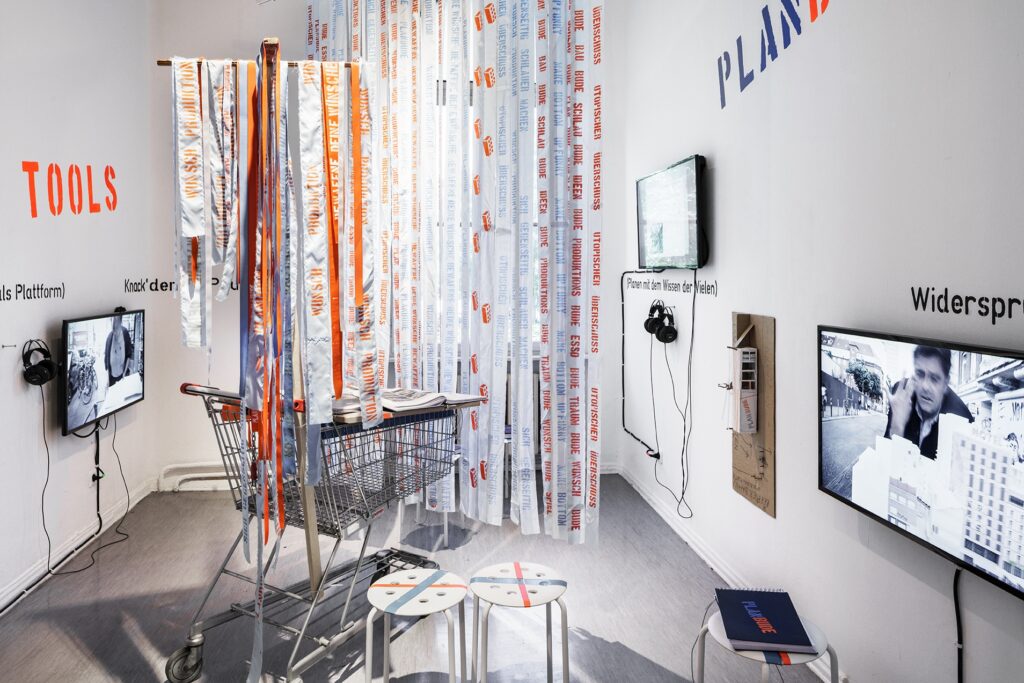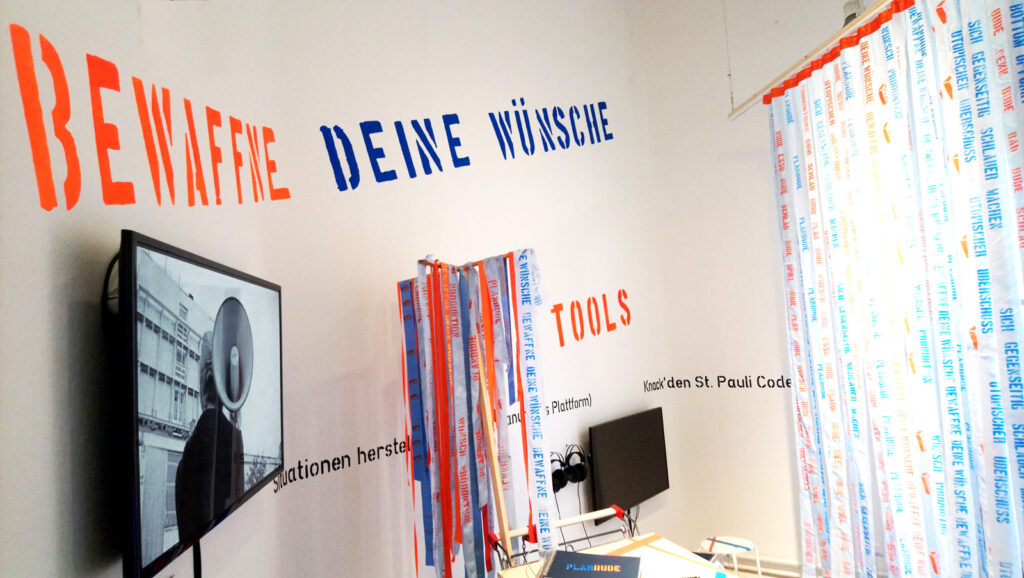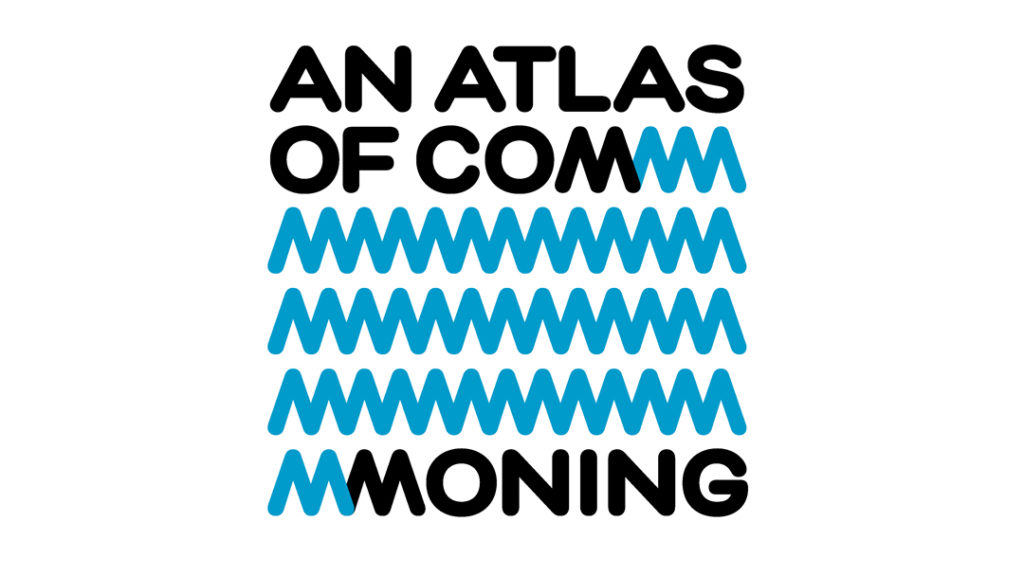“An Atlas of Commoning: Spaces of Collective Production”
An ifa exhibition in collaboration with ARCH+
Thurs. July 18, 6-8pm – Salon Series: Neither Public, Nor Private
Facilitator, Dana Bishop-Root Supported by The Heinz Endowments
Sept. 19–21 – Symposium: Designing for a Commons Transition
A forum for exchange between local and international practices of commoning

The international premier is presented in Pittsburgh in cooperation with the Carnegie Mellon University School of Architecture at the Miller ICA.
Facebook, Airbnb and other companies whose business models are based on the commercialization of social relationships, have transformed words like “community,” “sharing” or “we” into empty concepts that no longer represent solidarity or a progressive social agenda, but rather form the basis for an emerging platform capitalism. This economic development is accompanied by a global political shift fueled by traditional community notions of identity and affiliation, exclusion and discrimination. Against this background, the exhibition and publication project An Atlas of Commoningaims to recapture and redefine the open and emancipatory space of “we” as a concept. The project focuses on urban commons—here commons are to be understood as a set of practices dealing with the collective production and management of (material and immaterial) resources and spaces in general, rather than with the resources themselves, hence “commoning,” the verb, takes center stage.Commoning is a process of dealing with differences and conflicts between the individual, the community and society. A process of spatial organization in the relations between production and reproduction, ownership and access to resources. A process that brings together solidarity networks and redefines individual and collective rights. The project questions the prevailing social and political structures and seeks new forms of collective, yet pluralistic, governance.

The starting point of the exhibition is an Atlas, a visual archive with a diverse selection of contemporary and historical case studies. The Atlas, which is being developed by ARCH+ in collaboration with the School of Architecture at Carnegie Mellon University, will consist of 25 projects related to commoning. This initial selection is being complemented with new ones, added in collaboration with local partners as the exhibition tours from city to city. As a result, the “Atlas of Commoning” continues to grow as an open knowledge archive, producing an invaluable documentation of local grassroots projects from all over the world.
From the Atlas, the exhibition develops along three axes of investigation, each one illustrating the tension inherent in practices of sharing. The resulting chapters are: Ownership – Access, Production – Reproduction, Right – Solidarity. Artistic works open up further access to the subject. Part of the exhibition is an edition of ARCH+ magazine that delivers a broad insight into important theoretical positions and practical examples.
The Urban Design program at the CMU School of Architecture is hosting the international premier of the travelling exhibition after its German premier in Berlin last year. The Pittsburgh edition of the exhibition includes local practices of commoning and examples of citizen-led urban regeneration. Throughout the summer, a series of workshops, discussions and tours will provide a platform for the exchange of experiences, knowledge and skills about gaining agency in collectively producing the environment and communities we live in. In times of rampant cynicism, An Atlas of Commoningshows that there are boundless hopeful alternatives—alternatives that are already in the making all around us.

PUBLIC EVENTS
Opening: Sat. June 29, 5:30-7:30pm
Open Space Workshop: Commoning Pittsburgh, Sat. June 29, 1-5:30pm
Salon Series: Neither Public, Nor Private
Facilitator, Dana Bishop-Root Supported by The Heinz Endowments
Thurs. July 18, 6-8pm
Symposium: Designing for a Commons Transition
A forum for exchange between local and international practices of commoning
Thurs. Sept. 19–Sat. Sept. 21
Curatorial team: Anh-Linh Ngo, Mirko Gatti, Christian Hiller, Max Kaldenhoff, Christine Rüb (ARCH+); Elke aus dem Moore (ifa); Stefan Gruber (CMU)
Research partners: School of Architecture, Carnegie Mellon University Pittsburgh and and Technische Universität Berlin, Institute of Architecture, Prof. Rainer Hehl
Curators of Pittsburgh edition: Stefan Gruber, Elizabeth Chodos (CMU)
With contributions from:
Morehshin Allahyari & Daniel Rourke; clemens krug architekten & Bernhard Hummel Architekt (Team: Oliver Clemens, Anna Heilgemeir, Bernhard Hummel, Emma Williams); Assemble & Granby Workshop; Iwan Baan; Brandlhuber + Christopher Roth; DAAR Decolonizing Architecture Art Residency; Theo Deutinger; Eureka; Manuel Herz; Sandi Hilal, Philipp Misselwitz & Anne Misselwitz; Immo Klink; Kotti & Co; Kuehn Malvezzi; Angelika Levi; Golan Levin (F.A.T. Lab) & Shawn Sims (Sy–Lab); Makoko Waterfront Community; Tukano Maloca; Miethäuser Syndikat; National Union of Sahrawi Women; NLÉ Architects; PlanBude Hamburg, Svenja Baumgardt & Sylvi Kretzschmar; Common Ground e.V. & Nachbarschaftsakademie; Quest – Florian Köhl / Christian Burkhard; Martha Rosler; Harald Trapp / Robert Thum; Urban-Think Tank, Chair of Architecture and Urban Design ETH Zürich; WiLMa GmbH; Samson Young.
The “Atlas of Commoning” also includes works by:
Airbnb; ARGE ifau | HEIDE & VON BECKERATH; Atelier d’Architecture Autogérée; BARarchitekten; Bau- und Wohngenossenschaft Spreefeld Berlin eG; Carpaneto Schoeningh Architekten; City in the Making; FATkoehl Architekten; Die Zusammenarbeiter; El Campo de la Cebada; Genossenschaft Kalkbreite; Genossenschaft Kraftwerk1; Go Hasegawa and Associates; IBeB GbR; Müller Sigrist Architects; Refugee Accommodation and Solidarity Space City Plaza; Schneider Studer Primas; Stiftung House of One – Bet- und Lehrhaus Petriplatz Berlin; Gemeinde Yoshino; ZUS [Zones Urbaines Sensibles]. Pittsburgh initiatives include Breathe Project; City of Asylum; Community Forge; Garfield Community Farm; General Sisters, General Store; Latham Street Commons; Manchester Bidwell Corporation; The Braddock Carnegie Library.
Drawing collages by:
Students from Carnegie Mellon’s Master of Urban Design program, and the studio “Commoning the City” co-taught by Stefan Gruber and Jonathan Kline: Ernest Bellamy, Tamara Cartwright, Nickie Cheung, Yang Gao, Jianxiao Ge, Yidan Gong, Chase Kea, Rebecca Lefkowitz, Sai Narayan Ramachandran, Paul Moscoso Riofrio, Deepanshi Sheth, Sujan Das Shrestha, Gautam Thakkar, Aditi Thota, Yirui Wang, Alvin Wong, Chi Zhang, Chun Zheng, Lu Zhu.
Architectural models by:
Students from the Technical University Berlin taught by Rainer Hehl: Aaron Barnstorf, Sarah Baur, Sebastian Georgescu, Alexander Grams, Mirko Hahn, Nicolas Herre, Gerrit Jasper, Rosanna Just, Jakob, Köchert, Laura Lüttje, Miriam Möser, Stefan Neumaier, Daiki Ori, Canan Öztekin, Luisa Pöpsel, Nadine Reppert, Selina Schlez, Hans J. Walter (TU Berlin), as well as Martin Edelmann (ifa) and Quest – Florian Köhl / Christian Burkhard.
The production of the Pittsburgh edition was supported by the Graham Foundation for Advanced Studies in the Fine Arts, and the research by CMU’s School of Architecture Margaret B. Gruger Fund, the Berkman Faculty Develop-ment Fund and the Fund for Research and Creativity of the College of Fine Arts.
ifa (Institut für Auslandsbeziehungen)
The ifa (Institute for Foreign Cultural Relations) is the oldest German intermediary organization and celebrated its 100th anniversary in 2017. It is committed to the peaceful and enriching coexistence of people and cultures worldwide. Its programs pursue five core topics: Art & Culture Exchange, Civil Society Dialog, Flight & Migration, Culture & Conflict and Europe. The ifa promotes the exchange of art and culture in exhibition, dialog and conference programs and acts as a competence center for foreign cultural and educational policy. The institute is globally networked and focuses on long-term, partnership-based cooperation. It is funded by the Federal Foreign Office, the state of Baden-Württemberg and the state capital Stuttgart.
www.ifa.de/en
ARCH+
ARCH+ is Germany’s leading discursive journal for architecture and urbanism. The name is also a policy: more than architecture. Each quarterly issue details a specific topic, picking up on current discussions from other disciplines with regard to the cultural and political frameworks of spatial production. Founded in the wake of the 1968 movement, the focus of ARCH+ is the critical reflection of the social aspects of architecture. www.archplus.net
© Institut für Auslandsbeziehungen e. V. (ifa), Stuttgart, Germany; artists; authors
An Atlas of Commoning
Jun 29–Sep 22, 2019